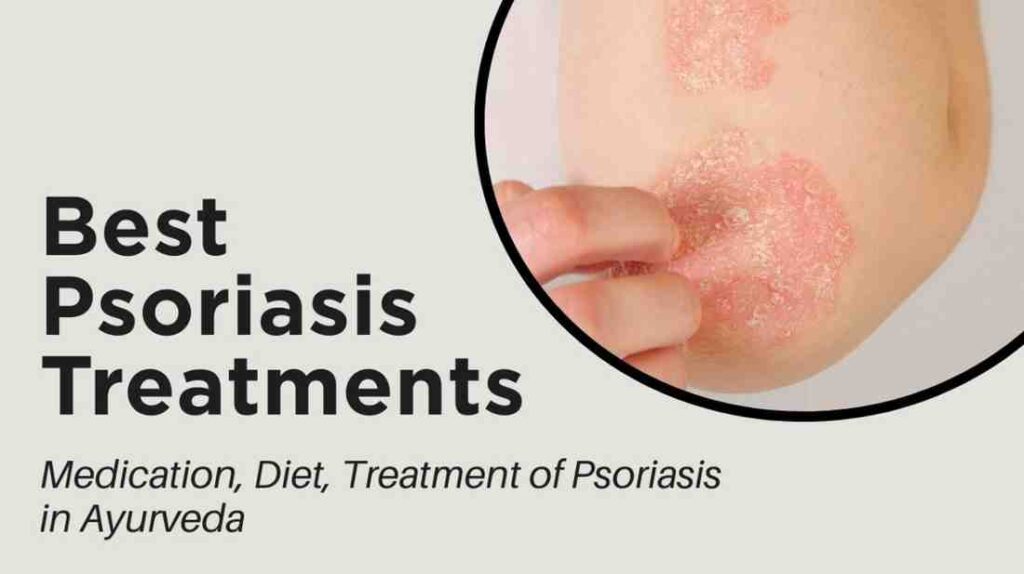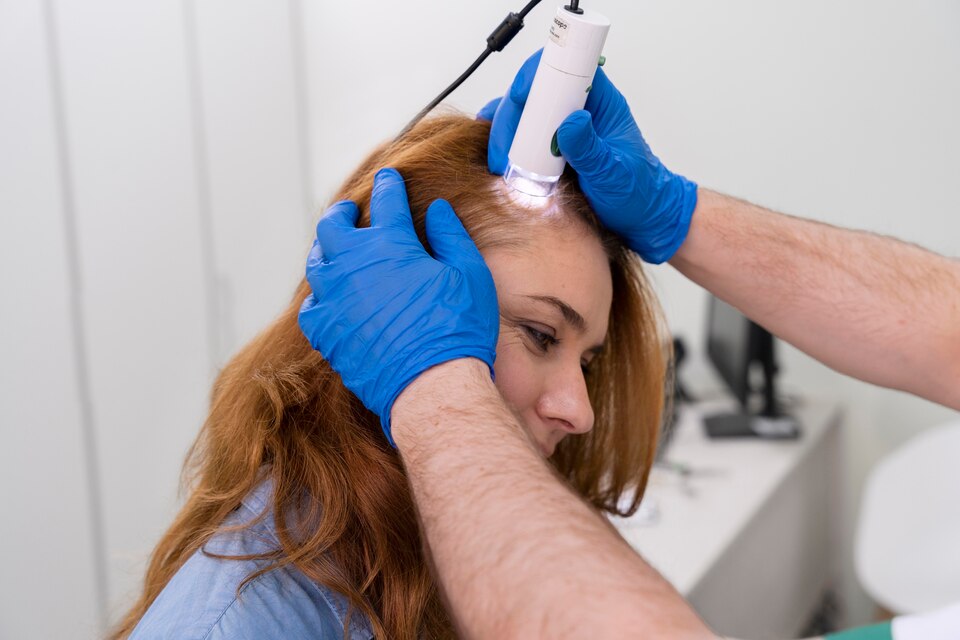Last updated on May 21st, 2025 at 04:47 pm

Psoriasis treatment is essential for managing this chronic skin condition characterized by the rapid growth of skin cells, which leads to the development of thick, red, and scaly patches on the skin’s surface. While there is no known cure for psoriasis, various psoriasis treatment options are available to help manage its symptoms and improve the quality of life for those affected by the condition.
The choice of treatment depends on the type and severity of psoriasis, as well as individual preferences and medical history.
Scalp Psoriasis Treatment
Scalp psoriasis is a subtype of psoriasis that affects the scalp and sometimes extends to the forehead, neck, and behind the ears. It can be particularly challenging to manage due to the presence of hair, but there are several effective scalp psoriasis treatment options available:
1. Over-the-Counter Shampoos
Over-the-counter (OTC) shampoos are often the first line of defence for mild to moderate scalp psoriasis. These shampoos typically contain active ingredients like salicylic acid, coal tar, or zinc pyrithione, which help break down and remove scales and reduce itching. They are readily available at drugstores and can be used as part of your regular hair care routine.
2. Prescription Medications
For more severe cases of scalp psoriasis or when OTC shampoos prove ineffective, dermatologists may prescribe topical medications. These prescription psoriasis treatments are stronger and include:
- Topical Corticosteroids: These medications contain corticosteroids that help reduce inflammation and itching. They come in various forms, including creams, ointments, lotions, and foams. Your dermatologist will recommend the appropriate strength and formulation based on the severity of your condition.
- Calcineurin Inhibitors: These topical medications, such as tacrolimus and pimecrolimus, work by modulating the immune system’s response in the affected area. They are often used for sensitive areas like the face and neck.
- Tazarotene: This topical retinoid is sometimes used for scalp psoriasis. It can help in slowing down the growth of the skin cells and reduce skin inflammation.
> Consult a doctor and Order Medicine Online
3. Phototherapy
Phototherapy, or light therapy, is another option for managing scalp psoriasis. It involves exposing the affected areas to ultraviolet (UV) light. There are two main types of phototherapy for psoriasis:
- UVB Phototherapy: This treatment uses narrowband UVB light to target the affected scalp areas. It can be administered in a dermatologist’s office or at home with a prescribed UVB comb or lamp.
- PUVA Therapy: PUVA combines psoralen (a light-sensitizing medication) with UVA light. It is typically used for more severe cases of psoriasis and is administered under medical supervision.
4. Systemic Medications
In rare cases of severe scalp psoriasis that doesn’t respond to topical treatments or phototherapy, systemic medications may be considered. These medications are taken orally or through injections and work throughout the body to suppress the immune response. However, they often come with more significant potential side effects and require close monitoring by a healthcare provider.
 Practical Tips for Scalp Psoriasis Treatment
Practical Tips for Scalp Psoriasis Treatment
In addition to medical treatments, some practical tips can help you manage scalp psoriasis effectively:
1. Gentle Care:
Be gentle when washing your hair. Use lukewarm water and fragrance-free shampoo. Avoid hot water and harsh products that can irritate your scalp.
2. Avoid Scratching:
Scratching can worsen psoriasis symptoms and lead to open sores and infections. Try to resist the urge to scratch your scalp.
3. Regular Removal of Scales:
Gently remove scales after softening them with a medicated shampoo or oil. Use a soft brush or a fine-toothed comb to avoid damaging your scalp.
4. Consistency:
Stick to your treatment plan and follow your dermatologist’s recommendations consistently. It may take some time to see significant improvements, so patience is key.
5. Avoid Triggers:
Identify and avoid triggers that can worsen the condition of your scalp psoriasis. These may include stress, certain hair products, and environmental factors.
6. Hydration:
Keep your scalp and hair well-hydrated by using a moisturizing conditioner or oil. This can help in reducing dryness and itching.
Read: What are Generic Medicines?
Scalp psoriasis can be a challenging condition, but with the right treatment approach and proper care, you can effectively manage its symptoms. Consult with a dermatologist and determine the most suitable treatment plan for your particular case.
Remember that managing scalp psoriasis is an ongoing process, and staying proactive and consistent with your treatments can lead to significant improvements in your scalp’s health and overall well-being.
Psoriasis Treatment Cream
1. Topical Steroids
Psoriasis treatment creams, such as topical steroids, are often recommended for managing psoriasis on other parts of the body. These creams can help reduce the inflammation and relieve itching. They come in various strengths, with your dermatologist determining the appropriate one for your condition.
2. Calcineurin Inhibitors
Calcineurin inhibitors are another class of topical medications used to treat psoriasis. They work by suppressing the immune system’s response in the affected areas. While they can be effective, they are usually reserved for specific cases due to potential side effects.
3. Psoriasis Treatment in Ayurveda
Ayurveda, the traditional Indian system of medicine, offers alternative treatments for psoriasis. Ayurvedic treatments often involve a combination of dietary changes, herbal remedies, and lifestyle modifications. It’s essential to consult with a qualified Ayurvedic practitioner for personalized guidance.
Best Treatment for Psoriasis
Determining the best psoriasis treatment depends on several factors, including the type and severity of your condition, as well as your medical history. It’s crucial to work closely with a dermatologist to create a personalized treatment plan. Some individuals may require a combination of treatments to achieve the best results.
Psoriasis Treatment Diet
- Anti-Inflammatory Foods: Diet plays a vital role in managing psoriasis. Incorporating anti-inflammatory foods, such as fruits, vegetables, and fatty fish, can help reduce inflammation and improve skin health. Avoiding processed foods and excessive alcohol consumption is also recommended.
- Gluten-Free Diet: Some individuals with psoriasis find relief by following a gluten-free diet. Gluten is a protein found in wheat, barley, and rye, and it can trigger inflammation in some people. If you suspect gluten sensitivity, consult with a healthcare professional before making dietary changes.
Conclusion:
Psoriasis is a complex skin condition that requires a multidimensional approach to treatment. With the guidance of a knowledgeable healthcare provider, you can explore various treatment options and lifestyle changes to effectively manage your psoriasis. Remember that treatment success may vary from person to person, so patience and persistence are key.
Incorporating a combination of medical treatments, lifestyle modifications, and stress management techniques can significantly improve your quality of life and reduce the impact of psoriasis on your daily activities.
If you or someone you know is dealing with psoriasis, seek professional help and support from healthcare providers and support groups. With the right resources and a proactive approach, you can lead a fulfilling life while managing psoriasis effectively.
FAQs on Psoriasis Treatment
Q1. What is Psoriasis Treatment?
Psoriasis treatment involves various approaches such as topical creams, phototherapy, and systemic medications to alleviate symptoms and manage chronic skin conditions characterized by red, scaly patches. However, there is no definitive cure for psoriasis.
Q2. How long does it typically take to see improvement with psoriasis treatment?
The timeline for improvement with psoriasis treatment varies from person to person. Some individuals may experience relief within a few weeks, while others may require several months of consistent treatment before significant improvement is noticeable. It’s essential to follow your dermatologist’s recommendations and be patient with the process.
Q3. What are the natural or home remedies for Psoriasis Treatment?
While some natural and home remedies for Psoriasis Treatment may provide relief from psoriasis symptoms, such as aloe vera and coconut oil, their effectiveness can vary from person to person. It’s essential to consult with a healthcare professional before trying any alternative treatments, as they can guide what may work best for your specific case and ensure that it complements your prescribed treatment plan.